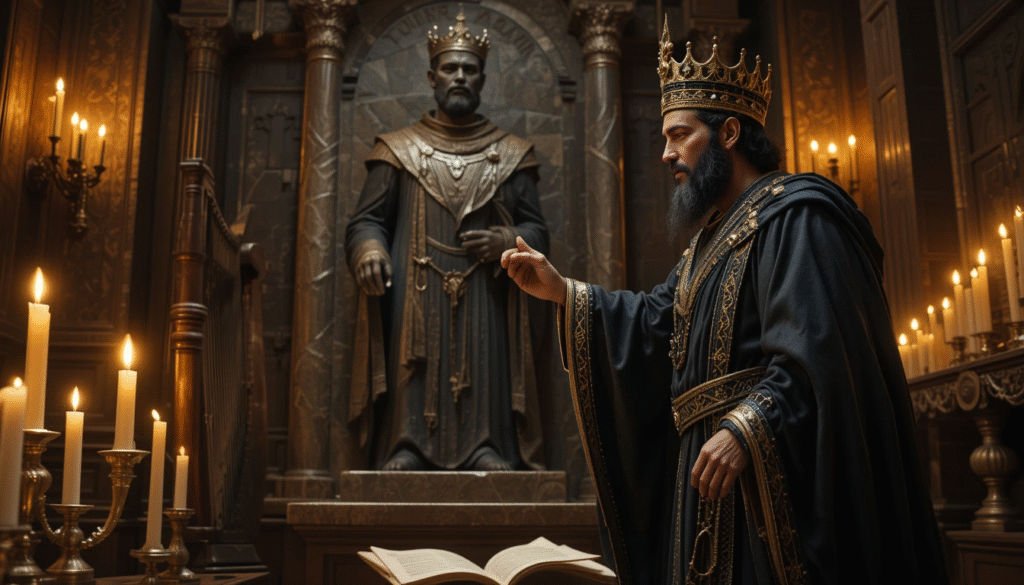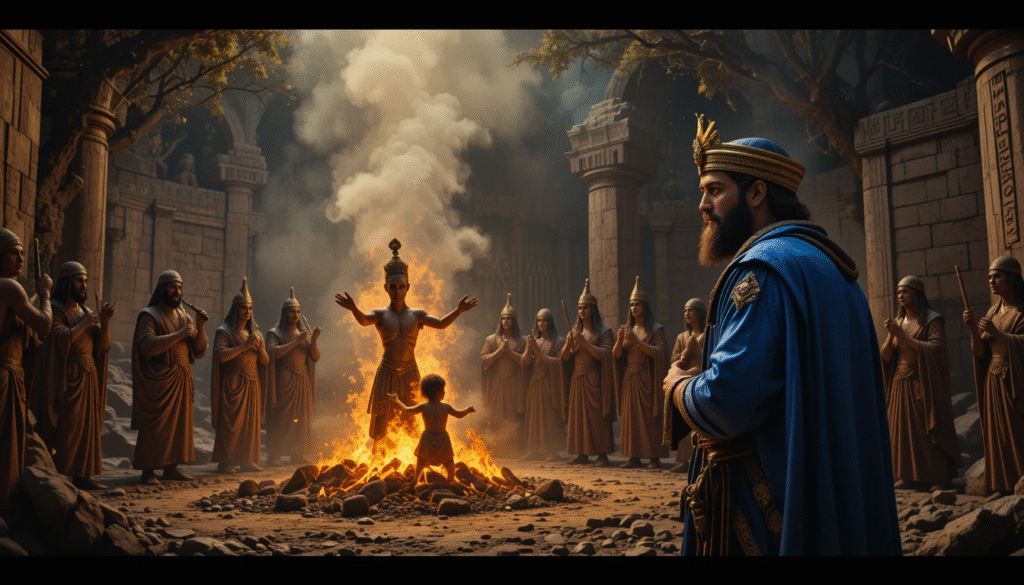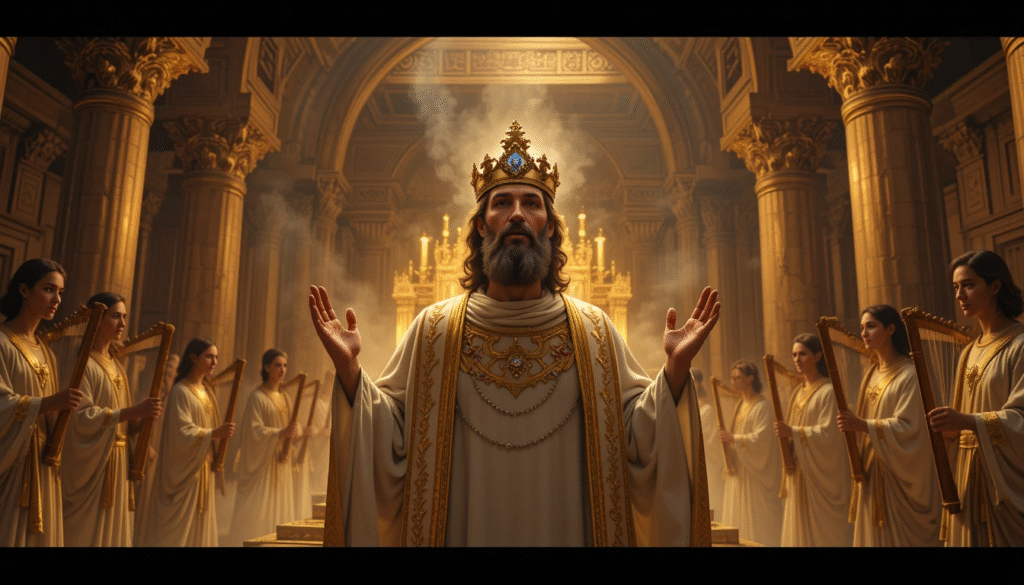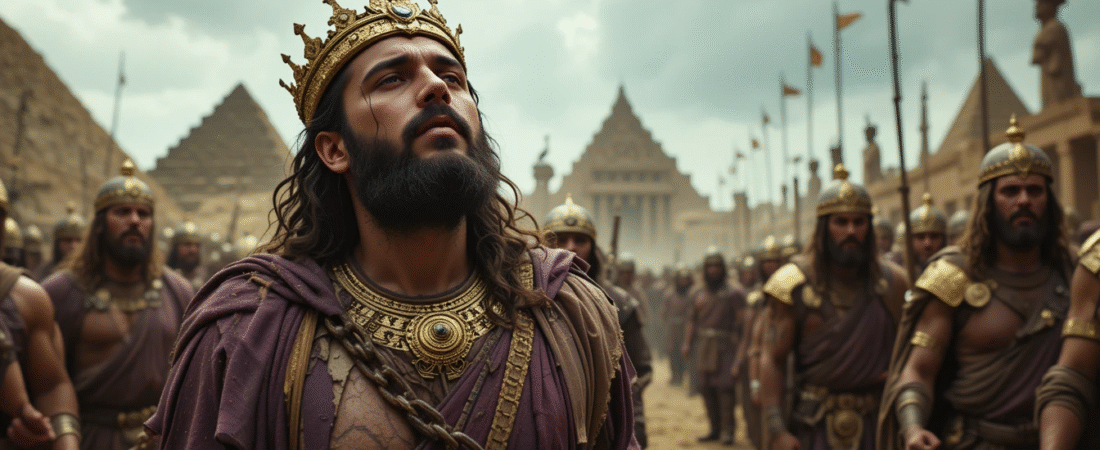Who was Manasseh in the Bible?
Manasseh was a king of Judah who ruled for 55 years, making his reign the longest of any king in Israel or Judah (2 Kings 21:1). He was the son of the righteous King Hezekiah and came to the throne at just 12 years old. Despite his father’s devotion to God, Manasseh chose a radically different path. He is often remembered as one of the most wicked kings in Judah’s history. He brought back pagan practices that his father had abolished, built altars to Baal, worshipped stars, and even practiced child sacrifice. But what sets Manasseh apart is not only how far he fell, but how far he came back. His life is a profound example of God’s mercy and the power of repentance.
What were Manasseh’s major sins?
Manasseh’s sins were numerous and deeply offensive to God. According to 2 Kings 21:2-6, he “did evil in the sight of the Lord” and followed the abominations of the nations that God had driven out of the land. He built altars for Baal and worshipped the host of heaven. He even placed an idol in the temple of the Lord—the very place where God’s name was to dwell. One of the most horrifying acts was sacrificing his own son in the fire, an act associated with pagan worship of Molech. He also practiced witchcraft, divination, and consulted mediums and spiritists. His actions misled the people of Judah to do more evil than the nations whom the Lord had destroyed.
How did Manasseh influence the nation of Judah?
The influence of Manasseh was far-reaching and deeply destructive. As king, he led Judah into spiritual and moral ruin. He reversed all the reforms of his father Hezekiah and actively promoted idolatry throughout the land. He built high places for idol worship and placed pagan altars even within the courts of the Lord’s temple. Because of his leadership, the people became steeped in sin, and judgment against Judah became inevitable. According to 2 Kings 21:9, “Manasseh seduced them to do more evil than the nations whom the Lord had destroyed.” His reign marked a spiritual decline that would eventually lead to the Babylonian exile.
Did Manasseh ever repent?
Yes, and this is one of the most remarkable parts of his story. While 2 Kings focuses on his sins, 2 Chronicles 33:10-13 reveals a different ending. When Manasseh was taken captive by the Assyrians and led away in chains to Babylon, he humbled himself before the God of his fathers. In his distress, he sincerely prayed to God, and God heard his plea. Manasseh was released and brought back to Jerusalem. Upon his return, he began to undo the evil he had done. He removed the foreign gods and idols from the Lord’s temple and restored the altar of the Lord, sacrificing peace offerings and thank offerings on it. His repentance was real, and it shows that no one is beyond the reach of God’s grace.
What changes did Manasseh make after returning to Jerusalem?
After being restored to his kingdom, Manasseh became a changed man. He not only removed idols but also worked to repair the spiritual damage he had caused. He fortified Jerusalem, stationed military commanders in all the fortified cities of Judah, and encouraged the people to worship the Lord God of Israel. According to 2 Chronicles 33:15-16, he removed the foreign gods and the image from the house of the Lord and threw them outside the city. He also rebuilt the altar of the Lord and sacrificed peace offerings and thank offerings on it. His later actions revealed genuine transformation, even though the people continued to sacrifice at the high places—though now to the Lord.
What does the story of Manasseh teach us about God’s forgiveness?

Manasseh’s story is one of the clearest biblical examples of God’s incredible mercy. Despite his long record of sin—including idolatry, murder, and blasphemy—God heard his sincere prayer of repentance. This teaches us that no one is beyond redemption. 2 Chronicles 33:13 says, “Then Manasseh knew that the Lord He was God.” It wasn’t until he hit rock bottom that he truly recognized God’s sovereignty. His life reminds us that repentance is not about words alone, but a change of heart and actions. God’s grace is greater than our past, and when we humble ourselves, He is ready to restore.
Was Manasseh mentioned elsewhere in Scripture?
Yes, Manasseh is mentioned in both the Old and New Testaments. In 2 Kings, 2 Chronicles, and again in Jeremiah 15:4, where it says God would bring judgment upon Judah because of the sins of Manasseh. He is also listed in the genealogy of Jesus in Matthew 1:10, which further shows how God can redeem even the most broken stories. Though his legacy includes deep evil, it also includes powerful redemption, which fits beautifully into the lineage that led to Christ.
How did Manasseh’s legacy impact future generations?
Although Manasseh repented, the spiritual and societal damage from his earlier reign had long-term effects. His son, Amon, followed in his early footsteps and did evil in the sight of the Lord. He reigned for only two years before being assassinated by his own officials. The people then made Josiah, Manasseh’s grandson, king. Thankfully, Josiah became one of Judah’s most faithful reformers. But according to 2 Kings 23:26, “the Lord did not turn from the fierceness of His great wrath, with which His anger burned against Judah, because of all the provocations with which Manasseh had provoked Him.” The judgment upon Judah was ultimately sealed because of the deep corruption during Manasseh’s reign.
What lessons can we learn from Manasseh’s life today?

Manasseh’s life is a powerful example of the depth of human sin and the even greater depth of God’s mercy. We learn that:
- Even those with a righteous upbringing can stray far from God.
- Leadership influences people spiritually and morally.
- God is patient and willing to forgive when we sincerely repent.
- Our past does not have to define our future.
- True repentance is demonstrated by changed actions, not just regretful words.
His story gives hope to anyone who feels too far gone. As Psalm 86:5 says, “For You, Lord, are good, and ready to forgive, and abundant in mercy to all those who call upon You.”
How is Manasseh different from other kings who sinned?
While many kings of Israel and Judah sinned, few repented as sincerely as Manasseh. Kings like Ahab or Jeroboam continued in their evil ways without remorse. Manasseh, on the other hand, turned to God in humility. The contrast is striking. His repentance wasn’t shallow or politically motivated—it came from deep personal distress and recognition of God’s holiness. The Bible honors that transformation by including it in the account of his reign, even if the earlier damage remained. His story reminds us that God sees the heart, not just the history.
Did Manasseh write any scripture or prayers?
While the Bible doesn’t include any writings by Manasseh, a non-canonical text called “The Prayer of Manasseh” exists and is found in some Christian traditions like the Eastern Orthodox Church. It is a beautiful prayer of confession and repentance that aligns well with the spirit of 2 Chronicles 33:12-13. Though not considered canonical by most traditions, the prayer echoes the tone of someone who truly turned back to God after a life of rebellion. Whether or not he authored it, the prayer has helped many believers express heartfelt repentance over the centuries.
How did Manasseh’s story end?
Manasseh died and was buried in his own house, not in the tombs of the kings (2 Chronicles 33:20). This detail, though small, reflects his unique and controversial legacy. His repentance was real, and his actions changed in the latter part of his life, but the early part of his reign left scars on the nation. Still, God accepted him. That truth stands as a timeless encouragement that genuine repentance brings real reconciliation with God.
Final Thoughts on Manasseh

The story of Manasseh is one of the most dramatic transformations in the Bible. He started as one of the most evil kings, promoting idolatry and committing unspeakable acts. Yet, through suffering and humility, he found his way back to God. His life reminds us that no sin is too great, no fall too deep, and no heart too hard for the mercy of God to reach. From rebellion to restoration, Manasseh’s journey is a beacon of hope for anyone seeking a second chance.
📚 Shop Our Favorite Ancient Texts
📖 The Book of Enoch 👉 https://amzn.to/4eCzsjj
📖 The Apocrypha Master Collection 👉https://amzn.to/3GvKWbM
📖 Ethiopian Bible in English (Complete 88 Books) 👉 https://amzn.to/45ToL9L
📖 The Book of Giants 👉https://amzn.to/44BDLqm
📖 The Dead Sea Scrolls Bible 👉 https://amzn.to/3Tp1ViV
📖 The book of Lilith 👉 https://amzn.to/4lA7Zkt
Also read more of our Insights here
